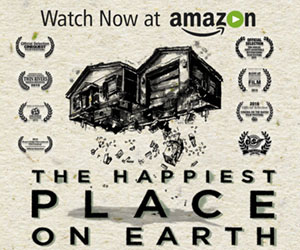
Watch the video interview on Youtube here
Film Courage: I think there’s a lot of social pressure and I know for Generation Xers like myself it’s always existed but now for Millennials and Generation Z this…not even just the 30 Under 30 of people [who are successful], now there is 25 under 25. We see younger and younger people achieving great things.
Jeffrey Davis: What I tell my students is great, get into the business in any job you can get into, pay your dues, and don’t say “Oh within a year I’ve got to be in a writer’s room as an assistant.” Because 9 chances out of 10, it’s not going to happen. If the lucky chance that it happens, great for you! And then bring your friends along. Because we tell (particularly grad students) on the first day of grad school look right and look left because that’s not just your posse, those are the people that are going to hire you.

But LMU [Loyola Marymount University] is not like other film schools, it’s not competitive, it’s more collaborative. I know USC is very competitive and I think that’s too bad because collaborative environment is always better to nurture other people while you’re trying to get what you want, that means that you will always have people that you’re working with.
Most of my seniors come out and if they haven’t changed their mind about writing, they work. They are all listed. This crop of seniors that just graduated in May, they’re all working in the business.
Peter Desberg: But we will want to edit out all of the bad stuff about USC out of there.
Jeffrey Davis: Nahhh! Keep it in.
Peter Desberg: [Raising his hand] USC graduate here.
Film Courage: Well, we can ask this thought (no schools mentioned though), how can one tell a collaborative environment versus competitive. Because sometimes competitive can mask as collaborative and then once you’ve been around a little bit [in this environment] you start to see “No…”
Jeffrey Davis: They care not just about their own work but other people’s work, are they involved? Do they work on other people’s work? I think that’s a big tell. And what are the teachers like? What are your bosses like?
Now the difference between school and a job. If your boss is an a**hole, there’s not much you can do about that except quit. And it’s good for you to work for a**holes (I think) because you will learn especially early on, you will learn how to deal with difficult people. It’s just a part of life.
Look, I have to work with Peter everyday.

Peter Desberg: But you’ve asked a really nuanced question.
Jeffrey Davis: Which is another pedagogical term – nuanced.
Film Courage: Oh good! I’m “nuanced.”
Peter Desberg: Because you’re making it sound like it’s binary. Are you collaborative…
Jeffrey Davis: We don’t know the word binary, Peter.
Film Courage: 0, 0, 1…
Jeffrey Davis: She’s thinking mathematically. He means it’s not one or the other.
Peter Desberg: I’ll get my answer in. I’m patient just like Adam.
Jeffrey Davis: If you start speaking English, perhaps?
Peter Desberg: And so the fact is in any environment the difference, the places where you find it’s competitive, you’ll find people being very evaluative, particularly negatively evaluative. “That’s not a good idea because…” “That wouldn’t work because…”
Jeffrey Davis: I don’t allow that in my class.
Peter Desberg: But good ideas are always recognized. So it’s always competitive because if you have the best ideas, you’re recognized as the best. Like LMU works really hard to be a supportive environment, yet here was this student who was clearly head and shoulder above everybody else. You’re going to get noticed by the quality of your ideas. So it’s competitive to the extent that you could stratify who are the best of the worst writers whether you’re supportive or competitive.
But the difference is the lumps you take along the way. In other words some people again come with this idea of “Look it’s an aggressive marketplace. We want to prepare you for it.” So if your ideas aren’t so great, we’re going to let you know it because you won’t have so many not-so-great ideas later as opposed to other places. I mean, I know for example people come to me all the time with ideas saying “Can you give me notes? Here’s my script, etc.” And what I found…
Jeffrey Davis: You should charge for that I think.
Peter Desberg: What I find is I almost never give criticisms. What I do is I ask questions and so if something doesn’t work for me, I don’t say “That doesn’t work.” or “That’s no good.” I say “Have you thought about this?” Or “Why is it work to have this be that? Or is there another way to do that?” So it’s never coming out as a put-down because people get very defensive when you put their stuff down.
Jeffrey Davis: It doesn’t help them either.
Peter Desberg: And I don’t want to dampen their enthusiasm and at the same point I don’t think it’s helpful. We’re asking them thought-provoking questions that they can answer…(Watch the video interview on Youtube here).
CHECK OUT PETER AND JEFFREY’S BOOK ON AMAZON here.
Now That’s Funny!: The Art and Craft of Writing Comedy

At the Writers’ Table with Hollywood’s Top Comedy Writers
by Authors Jeffrey Davis and Peter Desberg
CONNECT WITH JEFFREY DAVIS
CONNECT WITH PETER DESBERG

























